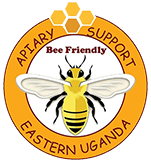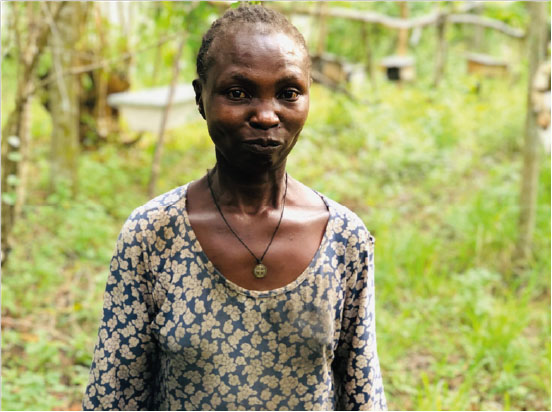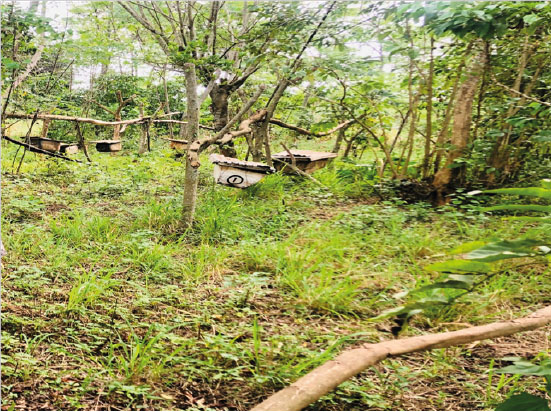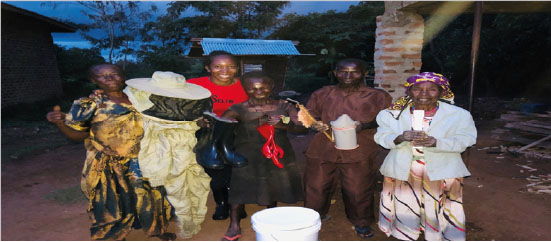Women in bee keeping
ASEU CONDUCTS A TRAINING ‘HOW TO OPERATE A BUSINESS SUCCESSFULLY
November 17, 2021My name is Ojiambo Harriet aged 34, a resident of Busiabala A, Lunyo Sub County in Busia district.
My passion for bee keeping began in 2019 after my mother Taaka Linnet attended a TOT training ‘How to be a professional bee keeper’ conducted by Piet de meester at Busaino Fruits in Bugiri organised by ASEU, then known as Jinja Honey Pride. ‘When they graduated from the course, she came and shared with us at home the knowledge and skill learnt’, says Harriet, ‘and that is how I started beekeeping’.
During my first season in practice, I started with 3 local hives because I was trying out the project to see if it really works. Besides that, being a person with a disability I never really wanted to put in much effort thinking that I would not manage it anywere.
However, luck and hard work hard it on my side. My local hives all colonised at the same time and within a few months I was able to harvest 20kgs from the 3 hives. These kilograms earned me Ugx. 400,000, each kilogram costing Ugx 20,000. ‘I was so excited and motivated to add more efforts into bee farming’, says Harriet.
The following year I then improved on the local beehives I had by introducing a new type of hive called KTB (Kenyan Top Bar hive) into my apiary. I bought 5 KTB hives. All together I now have 8 beehives.
My apiary is surrounded by a good environment i.e. coffee plantation, mangoes, sunflower all creating enough forage which makes it easy for hives to colonise very fast. At this moment all the hives colonised. I only check on them every month to see if they are building up the combs well, to check if the hives are in good condition and to see if they have constant water supply. The rest of the work is done for me by the honeybees.
During the implementation of this project, we had challenges of harvesting gears. ‘I used to borrow harvesting gears at a fee UGX. 10,000 from a fellow beekeeper’, says Harriet. This price was too high for me and it almost discouraged me from continuing with bee keeping. However, one evening as we were home preparing for dinner, we received guests from ASEU who had brought for us harvesting gears. ‘This is a donation from the Dutch Foundation and it must be shared among your groups’, said Maltina, the manager of ASEU.
We were extremely very happy! The solution for our problem was finally found! We were now able to own a set of harvesting gears i.e. bee overall, smoker, bee brush, hive tool, smoker, bucket and gum boots.
The market for honey is readily available. By the time of harvesting, I already have customers who book my honey in advance. I now have the capacity to process wax from the honey combs and sell it to other farmers who are starting bee keeping. So for me it’s now a double income.
I also have plans of further expanding the apiary by adding in more beehives in particular the KTB because they are easy to work with. I have a target of making 50 beehives.
This project has been a success for me because of my mother. She has guided and helped me where I am not able to. The activities that require a lot of energy, like carrying harvested honey, she does for me. She helps and supports me.
The message I leave to my fellow youth and my fellow privileged group is ‘disability is not inability’. I stopped feeling pity for myself and faced the world. I am now doing bee keeping despite my disability and am able to make a descent income for myself. ‘Let us all go out there and face the world, we have the power to make the world a better place to live’, adds Harriet.



